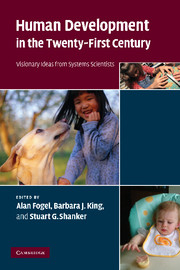Book contents
- Frontmatter
- Contents
- List of contributors
- Introduction: Why a dynamic systems approach to fostering human development?
- Part I Dynamic relationships between genetics and environments
- Part II The dynamic system of the child in the family
- Part III The dynamic system of the child in social and physical environment
- 10 The tempest: anthropology and human development
- 11 An anthropology of human development: what difference does it make?
- 12 The social child
- 13 Learning about human development from a study of educational failure
- 14 Dynamic views of education
- 15 Embodied communication in non-human animals
- 16 Children in the living world: why animals matter for children's development
- Part IV Dynamic systems approaches to mental health
- Part V Conclusions and outlook
- Index
13 - Learning about human development from a study of educational failure
Published online by Cambridge University Press: 22 September 2009
- Frontmatter
- Contents
- List of contributors
- Introduction: Why a dynamic systems approach to fostering human development?
- Part I Dynamic relationships between genetics and environments
- Part II The dynamic system of the child in the family
- Part III The dynamic system of the child in social and physical environment
- 10 The tempest: anthropology and human development
- 11 An anthropology of human development: what difference does it make?
- 12 The social child
- 13 Learning about human development from a study of educational failure
- 14 Dynamic views of education
- 15 Embodied communication in non-human animals
- 16 Children in the living world: why animals matter for children's development
- Part IV Dynamic systems approaches to mental health
- Part V Conclusions and outlook
- Index
Summary
In 1996, the then Chief Inspector of Schools in England referred to the problem of boys' increasing failure to match girls' achievements in school; particularly problematic, he suggested, was white working-class boys' failure to learn. By 2003 statistics revealed that only 18 percent of white working-class boys at school-leaving age (sixteen years old) achieved the minimum of five or more formal exam passes with grades between A and C. Marginally worse were Afro-Caribbean boys, of whom only 16 percent achieved a basic standard in secondary school qualifications, while boys from immigrant families of Indian, Pakistani, Bangladeshi, and Chinese origin were outstripping White and Afro-Caribbean boys' achievements.
Evident here is a classificatory confusion between race, class, nationality, and ethnicity, and it poses real problems for comparison. Leaving this aside, however, a focus on white working-class boys alone suggests that every year 30,000 boys in England are leaving secondary school with no formal qualifications. By school-leaving age their educational level is likely to be on par with boys just finishing their first year at secondary school at the age of eleven and, in any year, 10,000 white working-class boys are disappearing completely from the school system. Highlighting the failure of the majority of white working-class boys to do well at school allows us to reflect critically too on the educational failure of the majority of Afro-Caribbean boys, which is a problem that is usually characterized and analyzed in racial, and not class or cultural terms.
Information
- Type
- Chapter
- Information
- Human Development in the Twenty-First CenturyVisionary Ideas from Systems Scientists, pp. 119 - 127Publisher: Cambridge University PressPrint publication year: 2007
